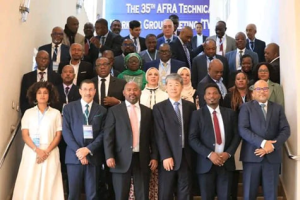
The oppressive heat of the departing sunny season, which tests the limits of even the heavy-duty air conditioner, is almost gone. The winds have begun to clash with the resilient tree leaves and the loose rooftops. The frequency of intermittent rain and the rumbling of the sky are increasing. The main rainy season, Kiremt, is almost here. The annual nationwide tree planting campaign, part of the Green Legacy Initiative, has already commenced. As Kiremit approaches, changing the scenery of the land and the sky, several good omens are emerging to forecast the coming of peace to the Ethiopian political landscape.
The much-talked-about agenda-gathering conference held in the capital recently, as a part of the process for the National dialogue was hailed by Ethiopians both home and abroad, and created an enduring peace vibe. Moreover, it appears to have set a domino effect in the dynamic and unpredictable movement of Ethiopian politics by kick-starting popular action for open and frank discussion about peace.
People from all walks of life, community leaders, scholars, elders, religious leaders, the youth, women and the men in uniform have begun actively participating in open discussion forums, shouldering their collective responsibility to ensure lasting peace and stability. They are now putting their heads together to deliberate with government authorities on solving the peace equation, which remains a mystery and therefore unsolved for a long time now.
This is a huge step forward for building lasting peace and is worthy of every admiration. Now the wind of peace has started blowing even in the Amhara region, the part of the country that has seen the longest series of violence, instability, and lawlessness for almost a year now. People in the region are now determined, and making a unified ‘chorus’, chanting ‘Peace for all and all for peace’. They have been holding a series of peace conferences from the village up to the regional level to bring normalcy to their region.
The determination of the federal and regional authorities to sit and deliberate directly with the representatives of the communities at the grassroots level is indicative of their unwavering commitment to travel the extra mile to build peace at any cost. The peace conference held at the regional level at Bahir Dar has identified ten points as commendations that would provide directions and identify focal areas of activity to build and sustain peace in the region.
It is expected that the authorities would act upon the outcome of the peace conference, which could be guiding principles for peace-building measures that should be translated into action by all stakeholders including the government. There is little doubt that the government would soon announce further bold actions based on the recommendation to expedite the momentum of the faint wind of peace that is starting to swish across the nation.
It is to be recalled that, speaking at the Abbay Bridge inauguration ceremony a month ago, Premier Abiy Ahmed (PhD) stressed the need to promote frank discussion among citizens, build common understanding, and share vision among all Ethiopians. “It is imperative to demolish the walls of divisive narratives, and build the bridge of narratives that nurture cooperation harmony, and peaceful coexistence among Ethiopian communities of various backgrounds and identities.”
Another piece of evidence proving the arrival of the wind of peace in Ethiopia is the successful execution of the bi-elections and rerun elections in various regions. Elections are primary indicators for the presence of sustainable and viable peace and stability in a given area. That means if it is possible to hold an election in a region, it is a definite affirmative confirmation of the presence of peace and stability in that region to an acceptable degree of normalcy that allows people to go about their daily routines as usual.
What is more interesting is some of these places that held elections a few days ago were the ones that were too insecure and unstable to conduct elections at the regular time when the 6th general election was held, which was in June 2021. One such region was the Benishangul Gumuz region, which was one of the most violence-riddled places in the country at that time.
Now the region by large has become stable and peaceful enough to hold elections with no reports of incidents of violence.
Citizens who were displaced in the wake of the violence in the region are back to their homes and livelihoods. Investors are now returning to Benishangul Gumuz to create wealth for themselves, job opportunities for their compatriots, and revenue for the state by harnessing the untapped rich natural resources of the region, which include fertile farmland, water resources, animal resources, thick forests like that of bamboo trees, and precious minerals.
The head of the National Election Board of Ethiopia, NEBE, announced a few days ago that her office has successfully conducted rerun elections and bi-elections in four regions of the country, which are Afar, Somali, Central Ethiopia, and Benishangiul Gumuz regions. The peaceful electoral processes held a few days ago covered a considerable portion of the population in 29 constituencies which include 1218 polling stations.
This is a huge achievement for Ethiopia that would boost and propagate the vibe of normalcy to another part of the country that needs sustainable peace and stability. It can be considered a good omen and reflection of the inevitable transition toward sustainable peace and the rule of law. Unfortunately, the peaceful electoral process and its successful execution did not get the adequate media coverage that it deserves.
The continued release of prisoners is also an encouraging step by the government, which can be seen as a gesture of peace, reconciliation and forgiveness. It can also be seen as another indicator of the government’s change of heart and its commitment to laying the foundation for lasting peace in Ethiopia. Several people who were in police custody and others who were charged in court and suspected and accused of alleged involvement in subversive and anti-peace activities are now free from prison.
Such gestures of peace by the government are eagerly awaited in the coming weeks as they would encourage all actors in Ethiopian politics to do their part in taking bold and reconciliatory steps in the interest of peace to ensure that the faint wind of peace becomes as strong as the increasing wind of the rainy season, which is getting stronger every day.
The good omen of peace is real it is not just a feeling or wishful thinking. It is based on a solid foundation, as set out in the above points. Because one thing should be clear. Ethiopians are tired of hearing news about violence. They want peace, and they want it now. The government has declared its willingness to meet with anyone for peace talks under any circumstances and without preconditions. We do believe the government is ready to put every in its power at the negotiating table in the interest of peace.
Rejecting the invitation to peace talks offered by the government rightly would be an absolute historical blunder and would mean going against the will and desire of the Ethiopian people and would have enormous consequences. Therefore, any political power has no wise choice but to accept the offer of peace talks if it wants to maintain its popular support, relevance, and political survival.
BY SOLOMON WASSIHUN
THE ETHIOPIAN HERALD TUESDAY 2 JULY 2024




